What is a Power of Attorney form?
A Power of Attorney (POA) form is a legal document that allows an individual (the "principal") to designate another person (the "agent" or "attorney-in-fact") to make decisions on their behalf. These decisions can range from handling financial transactions to making health care decisions, depending on the type of POA. It serves as a powerful tool for planning and ensuring that one's affairs will be managed according to their wishes should they become unable to do so themselves due to illness, absence, or incapacity.
Are there different types of Power of Attorney forms?
Yes, there are several types of Power of Attorney forms, each serving different purposes. The most common include: the General Power of Attorney, providing broad powers; the Special or Limited Power of Attorney, granting authority for specific tasks; the Health Care Power of Attorney, allowing decisions about medical treatment; and the Durable Power of Attorney, which remains in effect if the principal becomes incapacitated. Choosing the right type depends on the needs and circumstances of the individual.
How does one create a Power of Attorney?
To create a valid Power of Attorney, the principal must complete and sign a POA form, often in the presence of a notary or witnesses, depending on the state's laws. The form should clearly outline the powers granted to the agent and under what circumstances. It is also highly recommended to consult with a legal professional to ensure that the document meets all legal requirements and accurately reflects the principal's wishes.
Can a Power of Attorney be revoked?
Absolutely. A principal can revoke a Power of Attorney at any time, as long as they are mentally competent. The revocation must be done in writing and, similar to creating a POA, should follow specific procedures to ensure its legality, such as notifying the current agent and any institutions or individuals that may be affected by the change. Staying informed about the correct process is crucial for ensuring that the revocation is acknowledged and respected.
What happens if a Power of Attorney is abused?
Unfortunately, instances of abuse or misuse of a Power of Attorney can occur. In such cases, legal action may be necessary to protect the principal's interests. This might involve petitioning a court to revoke the Power of Attorney and seeking damages from the agent. If abuse is suspected, it's important to consult with a lawyer immediately to understand the options for recourse and safeguard the well-being and assets of the principal.
Is a Power of Attorney effective after death?
No, a Power of Attorney becomes void upon the death of the principal. After death, the control of the principal's estate transitions to the executor or personal representative named in their will. If there is no will, state laws of intestacy determine how the estate is managed and distributed. Preparing for this eventuality by having a will and other estate planning documents in place is advisable for a comprehensive approach to managing one's affairs.
